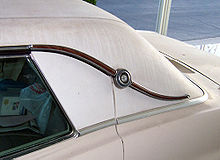| Revision as of 12:46, 2 May 2005 editMorven (talk | contribs)Autopatrolled18,655 editsm →Automobiles=← Previous edit | Revision as of 23:45, 12 June 2005 edit undoJtdirl (talk | contribs)Extended confirmed users24,275 editsmNo edit summaryNext edit → | ||
| Line 7: | Line 7: | ||
| The landau's center section might contain a fixed full-height glazed door, or more usually a low half-door. There would usually be a separate raised open driver's upholstered bench-seat, but a landau could be ]-driven, and there was ordinarily a separate groom's seat, sprung above and behind the rear axle, saving the groom from having to stand on a running board. | The landau's center section might contain a fixed full-height glazed door, or more usually a low half-door. There would usually be a separate raised open driver's upholstered bench-seat, but a landau could be ]-driven, and there was ordinarily a separate groom's seat, sprung above and behind the rear axle, saving the groom from having to stand on a running board. | ||
| The landau reached its full development by the mid-19th century It was purely a city carriage of luxury type. The low shell of the landau made for maximum visibility of the occupants and their clothing, a feature that makes a landau still a popular choice for ] |
The landau reached its full development by the mid-19th century It was purely a city carriage of luxury type. The low shell of the landau made for maximum visibility of the occupants and their clothing, a feature that makes a landau still a popular choice for ] on ceremonial occasions. | ||
| ]]] | ]]] | ||
| A distinguishing characteristic of the landau carriage is the external hinged supporting bars mounted on the outside of the folding top. When the top was up, these bars would lock into place, forming an elegant shallow 'S' shape. The bars are variously known as ''landau bars'', ''landau bows'', ''landau irons'' or ''S-bars''. | A distinguishing characteristic of the landau carriage is the external hinged supporting bars mounted on the outside of the folding top. When the top was up, these bars would lock into place, forming an elegant shallow 'S' shape. The bars are variously known as ''landau bars'', ''landau bows'', ''landau irons'' or ''S-bars''. | ||
Revision as of 23:45, 12 June 2005
A landau is a coachbuilding term for a type of carriage; the term has also been carried over into the automobile field, where it is generally used to mean a simulated convertible.
Coachbuilding
A landau is a lightweight open carriage on elliptical springs, invented in the 18th century (first noted in English in 1743 ), and named after the German city of Landau, where they were first produced. Lord, Hopkinson, coachmakers of Holborn London, produced the first English landaus in the 1830s (Museum Victoria). A landau, drawn by a pair or four-in-hand, is similar to a vis-à-vis, a social carriage with facing seats over a dropped footwell, which was perfected by mid-19th century as a swept base in a single flowing curve. Double soft folding tops at front and rear ordinarily lie perfectly flat but in a pinch can completely cover the passengers, latched at the center, with some loss of a graceful line , .
The landau's center section might contain a fixed full-height glazed door, or more usually a low half-door. There would usually be a separate raised open driver's upholstered bench-seat, but a landau could be postilion-driven, and there was ordinarily a separate groom's seat, sprung above and behind the rear axle, saving the groom from having to stand on a running board.
The landau reached its full development by the mid-19th century It was purely a city carriage of luxury type. The low shell of the landau made for maximum visibility of the occupants and their clothing, a feature that makes a landau still a popular choice for Lords Mayor on ceremonial occasions.

A distinguishing characteristic of the landau carriage is the external hinged supporting bars mounted on the outside of the folding top. When the top was up, these bars would lock into place, forming an elegant shallow 'S' shape. The bars are variously known as landau bars, landau bows, landau irons or S-bars.
Automobiles
Many coachbuilding terms transferred over to automobile usage, since coachbuilders began making motor car bodies instead, and because customers were familiar with coachbuilding terms. The landau, however, was not a style that transferred well to the automobile. A forward view was generally insisted upon by passengers, and so the half-landau landaulet style, instead of the landau, became a more popular choice. The landaulet opens over the rear seats, but not the front. Some of these vehicles were inaccurately described as 'landaus'.
In the 1920s and 1930s, especially in the United States, the term 'landau' became used for a simulated convertible, in which a fixed roof of a sedan with solid rear quarters was covered with fabric or leather and fitted with side landau bars in order to appear like a convertible top. This became the commonly accepted definition of 'landau' in North American usage thereafter.
Postwar, the term fell into disuse, only to be revived during the 1960s as the trend for such 'fake convertibles' with vinyl roofs established itself. Some of these vehicles were called 'landaus' by their manufacturers, and many were fitted with landau bars on the rear quarters. Some use the term 'Town Landau', and this generally means a wider rear pillar with no rear quarter windows, or a vinyl roof that only covers the rear seat area (and is thus reminiscent of a town car).
A landau roof is also commonly used on the North American hearse; very long closed rear quarters, a vinyl roof and huge, polished landau bars have been the preferred hearse style since before World War II.
External link
Reference
- Richardson, C., Driving : The Development and Use of Horse-Drawn Vehicles, London, 1985.